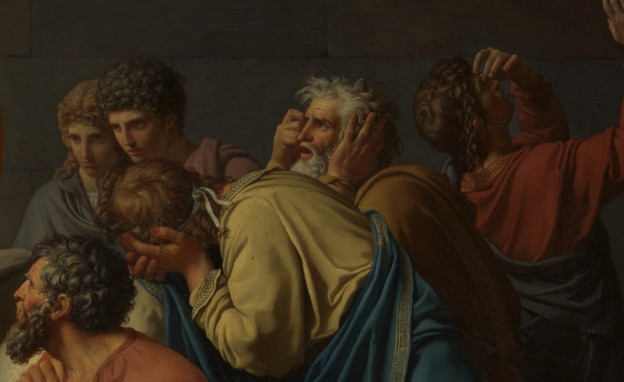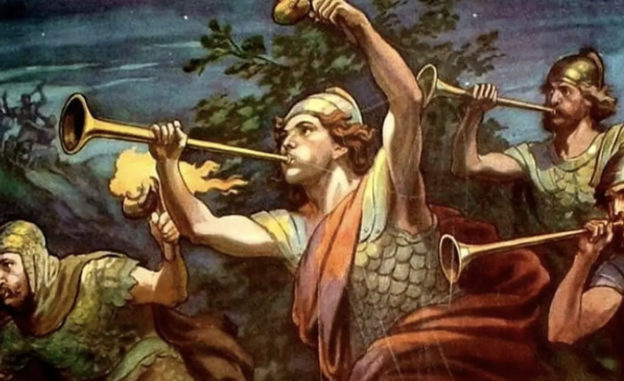Every Christian has a story of their salvation. Some are quite dramatic, with a series of events leading to their conversion. Some of us have boring salvation stories, involving growing up in the Church and growing to believe over time through the faithful teaching of parents, pastors, and older believers.
Whether dramatic or boring, each story has certain repeated elements. A recognition of our sinfulness. God’s revelation of salvation through Christ to us. Hearts that are made flesh to respond to that offer, and peace with God. The details of how that plays out are what makes the difference.
In Judges there are exciting salvation stories, and boring ones. The first example, that of God’s saving Israel through Othniel, falls into the boring category. But boring is often good. And the lack of excitement in Othniel’s judging allows us to see the cycle of salvation: sin and wrath, oppression and crying, and deliverance and rest.
Firstly, Othniel’s story reveals sin and wrath. Israel “did what was evil in the sight of the LORD” by abandoning worship of God for the Baals and the Ashteroth; the pagan false gods of the Canaanites that Israel should have driven out (v.7).
This sin brought about God’s wrath. God “sold them into the hand of Cushan-rishathaim king of Mesopotamia” (v.8). God acted to punish and discipline his covenant people by sending outsiders to rule over them. Israel served the Baals and the Ashteroth, so they got to serve a foreign oppressor.
Secondly, we see Israel’s oppression and crying. Israel served under occupation by Cushan-rishathaim for eight years. The arrangement was not pleasant. Cushan’s name translated into English means “Cushan the double-cursed”, probably a curse name given by Israel for their new ruler (based on the part of Mesopotamia he came from, “double cursed from the double rivers”). The result was Israel crying out to God for deliverance, presumably in repentance for their earlier apostasy (v.9).
Israel’s cries are not left unheard, and God sends deliverance. God “raised up a deliverer for the people of Israel, who saved them, Othniel the son of Kenaz, Caleb’s younger brother” (v.9). Othniel, mentioned in chapter 1 as a good solid God-fearing guy, but also technically a foreigner (via Moses’ father-in-law) who settled with and became part of God’s covenant people.
Othniel has no stated questionable character flaws. He is an ordinary, boring guy, for a boring story of a dramatic deliverance. Dramatic, because God is the deliverer, using Othniel as his instrument: “The Spirit of the LORD was upon him, and he judged Israel” (v.10).
Previously, God placed Israel in Cushan’s hand. Next, God places Cushan in Othniel’s hand when Othniel went out to war and his “hand prevailed over Cushan-rishathaim” (v.10).
Under Othniel’s hand, God delivered Israel from their oppression. They had an opportunity to start again under “boring” Othniel’s spiritual and physical leadership. “The land had rest forty years. Then Othniel the son of Kenaz died” (v.11). Under the rest of Othniel, they enjoyed forty years without war or oppression. Forty years of the goodness of God expressed to them through Othniel’s leadership.
That forty years of goodness could have extended for much longer, had Israel remained faithful to God beyond the days of Othniel’s leadership. Sadly Judges shows further apostasy and decline to come. But that period of rest demonstrated to Israel the benefits of God’s love and goodness in their faithfulness, just as their oppression demonstrated God’s anger and discipline at their unfaithfulness.
The rest reminds us to rest in God’s goodness towards us as his children because of our own salvation stories. Whether dramatic or boring, those stories allow us to experience the goodness of God in our lives as we enjoy rest from the anger and wrath of God for our sin. We should seek to live our lives as much as we can in faithfulness to God, to avoid his discipline.
While we see the rise and fall of countries as the result of various causes and factors, this passage again makes clear that God is sovereign over events and ordering them for his own purposes. Israel was oppressed because God sent them into Cushan-rishathaim’s hand as punishment for sin and to draw Israel back to God. Then they were delivered, because God handed Cushan-rishathaim into Othniel’s hand.
There is no reason we should not view any other event of history through the same lens, even if we do not know the specific inner workings of God’s mind. God is in control of who does the ruling and who does the ruled. God does this to advance his purposes and plan, to fulfil his promises, and to bring about his righteous reign. In all the evil and uncertainty of this world, we can take comfort that God is in control.
The boringness of this salvation story, through a boring ordinary God-fearing guy, highlights that it is God who saves. Not us. Whether our salvation story is dramatic or boring, it is God who dramatically rescued us from our sin. Sometimes, boring is dramatic enough.


